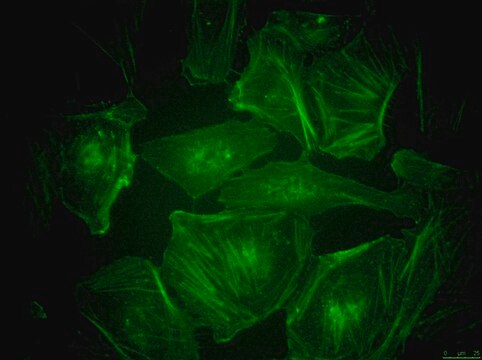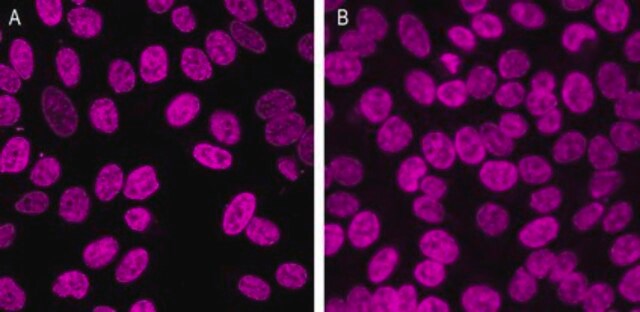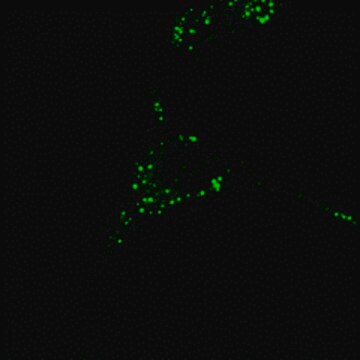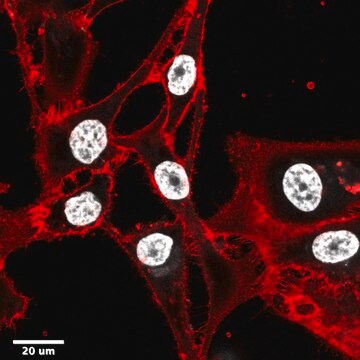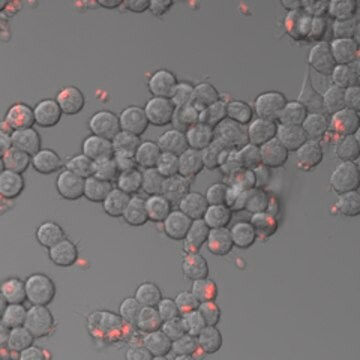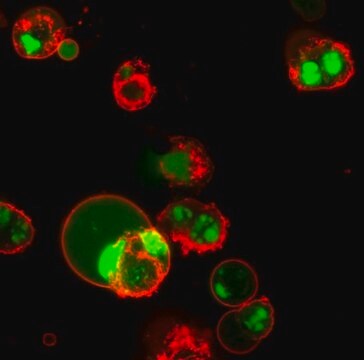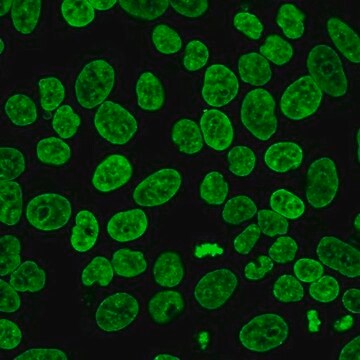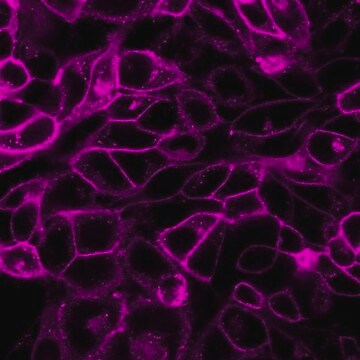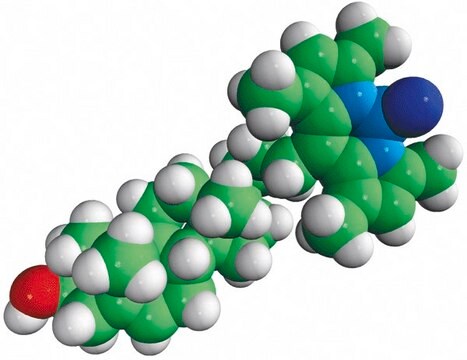SCT089
BioTracker™ rRNA Live Cell Probe
Fluorescent detection of ribosomal RNA and cell nucleoli
Sinónimos:
live cell probe, nucleoli probe, nucleolus probe, rRNA dye, rRNA probe, ribosomal RNA probe
Iniciar sesiónpara Ver la Fijación de precios por contrato y de la organización
About This Item
Código UNSPSC:
12171501
NACRES:
NA.31
Productos recomendados
Descripción general
The BioTracker™rRNA live cell probe is a styryl quinolinium dye that selectively binds ribosomal RNA (rRNA) in the cytoplasm and nucleoli of mammalian cells 1. This probe is a fluorescent small molecule that demonstrates high affinity to rRNA and therefore enables imaging of the nucleolus. Due to its low cytotoxicity, it enables detection in living systems with minimal interference.1 . As imaging technologies progress, there is increased demand for reagents that can detect diverse organoids and enable observation of subcellular functions in living cells. The optimal fluorescent reagent for live cell imaging should show high specificity to target along with low cytotoxicity 2 . Because the nucleolus is a dense organoid composed of chromatin and numerous protein components, the development of fluorescent reagents for live cell nucleoli detection is even more challenging 2,3,4. BioTracker™ rRNA live cell probe is easy to use, emits light in a longer wavelength to reduce phototoxicity and facilitate multiplexing, and can enhance nucleolar imaging dynamics.
Spectral Properties:Fluorescence images obtained by λex = 570 nm and emission at 647-667 nm.
Spectral Properties:Fluorescence images obtained by λex = 570 nm and emission at 647-667 nm.
Aplicación
Live cell imaging probefor detection of ribosomal RNA (rRNA). Can also be used in fixed cell or tissuesamples, such as with a nuclear counterstain to identify nucleoli.
Calidad
Purity: ≥ 95% confirmed by HPLC. Molar Mass: 298 Da confirmed byLC-MS.
Almacenamiento y estabilidad
Store BioTracker™ rRNA Live CellProbe at 2-8 °C, desiccated and protected from light
Note: Centrifuge vial briefly to collect contents at bottom ofvial before opening.
Note: Centrifuge vial briefly to collect contents at bottom ofvial before opening.
Información legal
BioTracker is a trademark of Merck KGaA, Darmstadt, Germany
Código de clase de almacenamiento
11 - Combustible Solids
Clase de riesgo para el agua (WGK)
WGK 3
Punto de inflamabilidad (°F)
Not applicable
Punto de inflamabilidad (°C)
Not applicable
Elija entre una de las versiones más recientes:
Certificados de análisis (COA)
Lot/Batch Number
It looks like we've run into a problem, but you can still download Certificates of Analysis from our Documentos section.
Si necesita más asistencia, póngase en contacto con Atención al cliente
¿Ya tiene este producto?
Encuentre la documentación para los productos que ha comprado recientemente en la Biblioteca de documentos.
Red emissive cross-linked chitosan and their nanoparticles for imaging the nucleoli of living cells.
Ke Wang et al.
Carbohydrate polymers, 102, 699-707 (2014-02-11)
Biocompatible glutaraldehyde-cross-linked chitosan with new red fluorescence were prepared for the first time and were shaped into nanoparticles via inverse-microemulsion method. They could luminesce at ca. 670 nm either as powders and nanoparticles or in real and gelling solutions or
Applying styryl quinolinium fluorescent probes for imaging of ribosomal RNA in living cells
Abed Saadya, Eli Varonb, Avi Jacobb, Yaron Shav-Talb, Bilha Fischera
Dyes and Pigments, 174 (2020)
Tae-Keun Kim et al.
Cells, 8(7) (2019-07-13)
The cell nucleus is three-dimensionally and dynamically organized by nuclear components with high molecular density, such as chromatin and nuclear bodies. The structure and functions of these components are represented by the diffusion and interaction of related factors. Recent studies
Nuestro equipo de científicos tiene experiencia en todas las áreas de investigación: Ciencias de la vida, Ciencia de los materiales, Síntesis química, Cromatografía, Analítica y muchas otras.
Póngase en contacto con el Servicio técnico